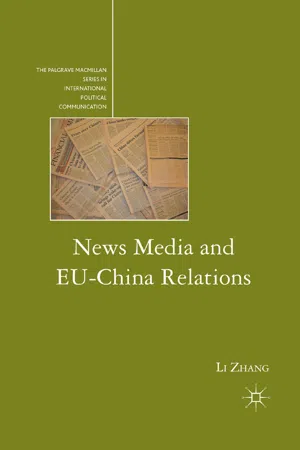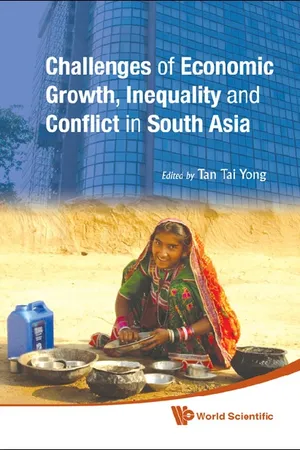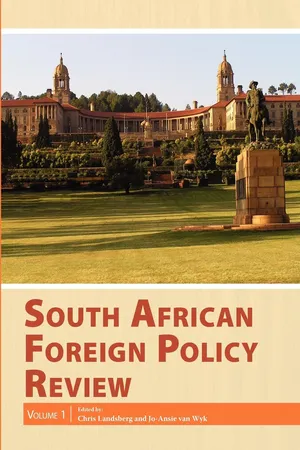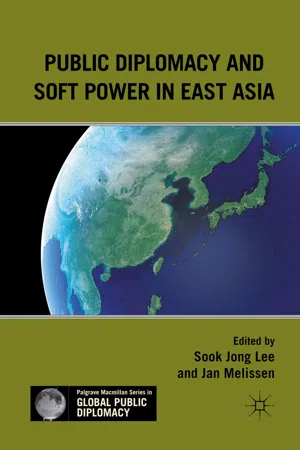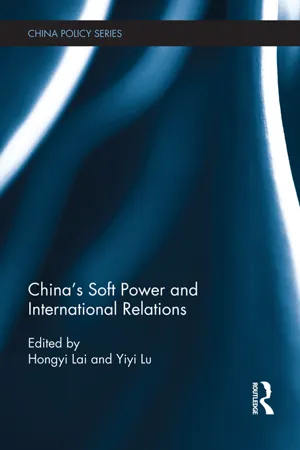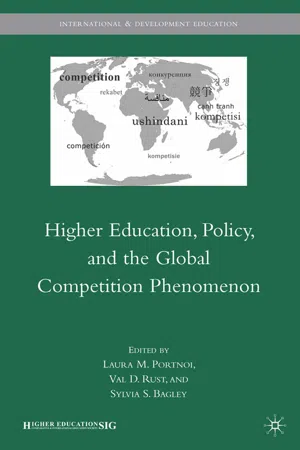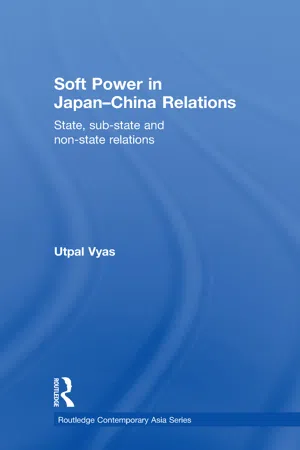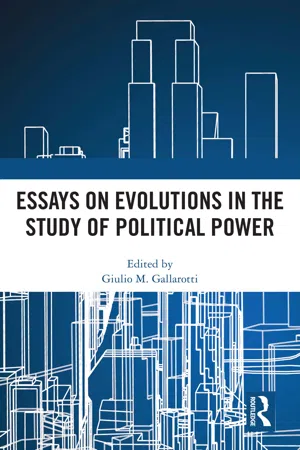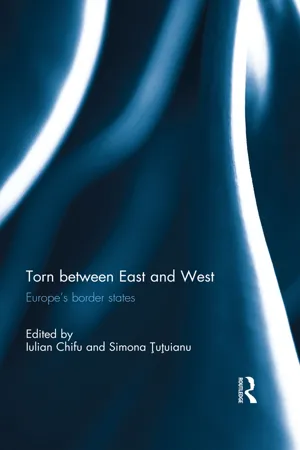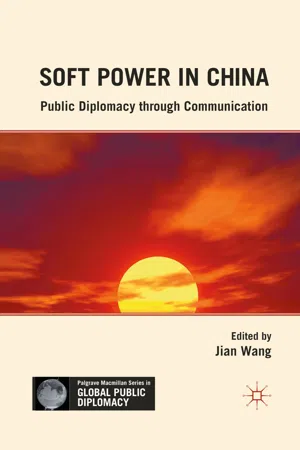Geography
Soft Power
Soft power refers to a nation's ability to influence others through attraction and persuasion rather than coercion or force. It involves the use of culture, political values, and foreign policies to shape the preferences of other countries. In the context of geography, soft power can be seen in a country's ability to build positive perceptions and relationships with other nations through its cultural exports, diplomacy, and international aid.
Written by Perlego with AI-assistance
Related key terms
1 of 5
10 Key excerpts on "Soft Power"
- eBook - PDF
- L. Zhang(Author)
- 2011(Publication Date)
- Palgrave Macmillan(Publisher)
1 Hard power rests on threats or induce- ments: for example, military and economic ones. Soft Power is the ability to shape the preferences of others. It co-opts people rather 14 NEWS MEDIA AND EUCHINA RELATIONS than coercing them. In the information age, the value of Soft Power becomes important. “Success depends not only on whose army wins, but also on whose story wins.” 2 Soft Power rests primarily on three resources: its culture (in places where it is attractive to others), its political values (when it lives up to them at home and abroad), and its foreign policies (when they are seen as legitimate and having moral authority). If the content of a country’s culture, values, and policies is attractive to foreign governments and publics, Soft Power arises. 3 Soft Power is the power of attraction. The attractiveness is embed- ded in what is called a nation’s “brand.” The basic assumption is that territorial entities such as countries, regions, and cities can now be branded in the same way as companies and products. If corporate branding has become an essential part of the business that helps audi- ences to identify with the company and encourages them to buy its products and services, nation brand, in a similar way, has become essential to create value in the relationship between territorial entities and individuals. 4 The concept of nation branding, along with region branding and city branding, is part of the concept of place branding, which was first proposed by Philip Kotler et al. and further developed by other researchers. 5 Peter van Ham argued that place branding is part of a wider spectrum of postmodern power, where Soft Power and public diplomacy have their place. - Tai Yong Tan(Author)
- 2009(Publication Date)
- World Scientific(Publisher)
108 B. Debroy In contrast to cultural influence, Soft Power, as a term, is of relatively recent vintage and is identified both with Joseph Nye 2 and with the American influence. “What about Soft Power? The basic concept of power is the ability to influence others to get them to do what you want. There are three major ways to do that: one is to threaten them with sticks; the second is to pay them with carrots; the third is to attract them or co-opt them, so that they want what you want. If you can get others to be attracted, to want what you want, it costs you much less in carrots and sticks.” 3 In a different day and age, this is reminiscent of Kautilya’s 4 Arthashastra , particularly the ninth chapter, where there is a reference to sama (conciliation or pacification), dana (gifts), danda (coercion, punishment or force) and bheda (dissension). In that jargon, the point being made is that sama results from cultural influences and is cheaper and more effec-tive than dana , danda and bheda . And if sama is successful, the other three options may well be unnecessary. For instance, “No two coun-tries that both had McDonald’s had fought a war against each other since each got its McDonald’s.” 5 Friedman’s assertion was not meant to be a blanket assertion and was more suggestive. Depending on how one defines war, countries that had McDonald’s have gone to war, Russia and Georgia are but one instance. Down the years, India’s influence in the region has been consid-erable, often in ways we are not even aware of. The name Canon is a case in point, derived from Avalokiteshvara. 6 Avalokiteshvara means the lord who looks down and is probably pre-Buddhist in origin. In Sanskrit, it is easy to confuse letters that are similar and 2 Especially the books The Paradox of American Power (2002), Soft Power: The Means to Succeed in World Politics (2004), The Power Game: A Washington Novel (2004) and Understanding International Conflicts , 6th edition, (2006).- eBook - PDF
- Chris Landsberg, Jo-Ansie van Wyk, Chris Landsberg, Jo-Ansie van Wyk(Authors)
- 2012(Publication Date)
- Africa Institute of South Africa(Publisher)
According to Nye, Soft Power is the influence that enables a state to achieve the outcomes it wants in its international interactions, not through coercion or rewards, but through its attractiveness. 9 A state’s attractiveness, which is closely linked to its reputation and image, is a complex mixture of perceptions, history, current events, consumer goods, and so forth. A posi-tive image can be conveyed by various instruments or drivers of Soft Power, from popular and elite culture, public diplomacy, business actions abroad, international perceptions of a government’s policies, and the attractiveness of a state’s economic strength. 10 In terms of behaviour, hard power involves coercion or inducement, while Soft Power involves attraction and cooption. This focus on behaviour is an important one, for policy-makers often mis-take power for resources. It allows us to see how military and economic force, although generally regarded as hard power, can be used to attract and co-opt (in other words, to generate Soft Power). An example would be the use of military power for purposes of peace keeping or humanitarian assistance. So while Soft Power is often conflated with related yet distinct concepts such as public diplomacy, or cultural diplomacy, in this chapter it is re-garded as an overarching term, which is the result of the effective use of potential Soft Power resources generated by both state and non-state actors. 71 This also means that we should take a more encompassing view of the in-struments that can create it. Broadly, these instruments can be divided into the following categories: formal/traditional diplomacy, public diplomacy, culture (including values) and economic activities. - eBook - PDF
- Jan Melissen, S. Lee(Authors)
- 2011(Publication Date)
- Palgrave Macmillan(Publisher)
What Is Soft Power? How Does It Work? It is well known from Nye’s original 1990 formulation that Soft Power refers to a country’s ability to obtain the outcomes that it wants not through coercion or rewards but through persuasion and attractive- ness—particularly the attractiveness of its culture, political values, and policies. In Nye’s words, Soft Power is about the “co-option and seduc- tion” of others by shaping their preferences in line with what you want. 5 Nye notes that Soft Power is a policy instrument that is particularly effective in the post–cold war era, featuring globalization-led intense economic interdependence and information flows through border- crossing media transmissions, while military conflict is less prominent in world politics. Because of this contextual change from the cold war to the post–cold war, Nye claims that the efficacy of power in world politics is more and more associated with the ability to set agendas and Soft Power as Productive Power 35 structure interactions within and between states through the politics of creating the prevailing “global norms” via domestic values, ideas, and policies. 6 Nye calls this ability “Soft Power” as opposed to the hard power of ordering others to do what you want. Ultimately, according to Nye, the advantage of using Soft Power over hard power is that it lowers the costs of getting what you want (or getting compliance from others in a situation of conflict of interests) through the nexus of attrac- tiveness/persuasion and legitimacy: “seduction is always more effective than coercion, as you do not have to spend as much on sticks and car- rots to move them in your direction.” 7 The examples of Soft Power that are offered by Nye include parental socialization of their children, as well as the practices of philosophers and politicians who use ideas that lead others into particular modes of thought and action. - eBook - ePub
- Hongyi Lai, Yiyi Lu, Hongyi Lai, Yiyi Lu(Authors)
- 2012(Publication Date)
- Routledge(Publisher)
23Specifically, Nye identified three resources of Soft Power: culture, political values (which also include living up to one’s values), and foreign policies.24 As far as foreign policy is concerned, Nye maintained that foreign policy should be seen as legitimate and moral in the world and that it includes public, bilateral, and multilateral diplomacy.25 He also suggested that the behavior for mediating Soft Power consists mainly of attraction and agenda setting.26 However, much of Nye’s discussion focused on popular culture, political values, and legitimate foreign policies (including public diplomacy) and was conducted largely in the context of the effectiveness of US foreign policy compared to that of other nations.Nye rightly called our attention to the importance of gaining international support and legitimacy for a nation’s foreign policy and of cultivating a positive image of that nation. He also shed light on the relatively soft components of power, including culture and values, as well as soft aspects of power, such as appeals and attraction.However, one can question his components of Soft Power. If Soft Power, as co-optive power, operates through attraction to other peoples, then the sources of attraction Nye listed seem to miss ones that are more important. It is possible that other people or nations are attracted to the United States for its military might, economic prowess, and trade opportunities, or for technological advancement, not merely for its pop culture, values, and diplomacy, and look to the United States as a worthy leader. Arguably, it is even more likely that other peoples and nations respect the United States as a consequence of these hard power resources rather than the three Soft Power resources Nye noted. This point is particularly pertinent in East Asia and to a lesser extent South-East Asia. A public opinion survey in early 2008 suggested that Japanese and South Koreans thought that America had far greater Soft Power than China, and that Indonesians and Vietnamese believed US Soft Power had the edge over that of China.27 - V. Rust, L. Portnoi, S. Bagley, V. Rust, L. Portnoi, S. Bagley(Authors)
- 2010(Publication Date)
- Palgrave Macmillan(Publisher)
JOSEPH STETAR ET AL. 192 the projection of “Soft Power.” Soft Power—which Nye conceived as a political strategy used to foster appreciation and acceptance of a nation’s culture and values—draws on the subtle effects of culture, values and ideas, in contrast to the more direct, tangible measures that hard power encompasses (such as military force or economic influence). Soft Power seeks to gain appreciation for a nation’s culture organically, as contrasted with hard power’s more forceful nature. It uses a combination of attraction and persuasion to reach its expected outcome; hard power threatens, while Soft Power encourages. This attraction and encouragement can stem from a nation’s ideals, traditions, religion, art, language, or a combination of these entities. Soft Power flourishes when the nation projecting that power is well-respected on an international scale. Nye suggests that a nation with effective Soft Power initiatives has little need for immense, excessive, costly, and often insufficient hard power strategies (Nye 2005). In a world intimately connected by technology and fueled by a growing knowledge economy, nations and various religious, cultural and linguis- tic groups increasingly see universities as powerful instruments for pro- jecting Soft Power and expanding their spheres of influence. There is, for example, considerable competition between Russian-language private uni- versities in Eastern Ukraine and Ukrainian-medium private universities in the western portions of that nation. There is also competition among Western-sponsored Christian universities, and those sponsored by the Orthodox Church (Stetar et al. 2007). In Middle Asia, nations such as the Kyrgyz Republic are witnessing an emerging competition between liberal Western-style universities, traditional Russian higher education, and more fundamentalist Muslim institutions.- eBook - ePub
Soft Power in Japan-China Relations
State, sub-state and non-state relations
- Utpal Vyas(Author)
- 2010(Publication Date)
- Routledge(Publisher)
Therefore, it can be said that Soft Power represents other co-operative activities which occur between nations, and in turn affect the practices and norms of those nations. These can include such activities as cultural exchanges, educational exchanges, and economic and political co-operation.Soft Power does not only result from these active policies, but it also results from policies which create an environment for the exchange of ideas, services and goods. In particular cultural trade, trade in techniques, technology and educational goods promote this kind of exchange; however, ultimately all goods which have been manufactured or services which have been created carry people’s ideas with them. These are ideas which have gone into the creation of those products, and are therefore inherent within them.Soft Power also emanates from the attractiveness of a country’s identity. Identity in this case consists of a country’s habits, practices and image (Hopf 2002, Wendt 1994), information about which has been transmitted through communication and discourse to other countries over a period of time. In this respect, people in one country may be attracted to the lifestyles, practices and ideas of people in another country, and thereby try to obtain or emulate them. The attractive country’s identity therefore can be said to influence the attracted country. The most often cited example of this has been the attraction of American lifestyles to many people around the world; these are seen as embodying individual freedom and choice, concepts which may be especially attractive to people living in circumstances where they are oppressed politically or economically. This kind of American Soft Power, however, is mitigated by other aspects of US policy; in areas of the world where the USA applies unwelcome hard power, its Soft Power is diminished. Nye notes that:Serbs eating at McDonalds supported Milosevic, and Rwandans committed atrocities while wearing T-shirts with American logos. American films that make the United States attractive in China or Latin America may have the opposite effect and actually reduce American Soft Power in Saudi Arabia or Pakistan. But in general, polls show that our popular culture has made the United States seem to others “exciting, exotic, rich, powerful, trend-setting – the cutting edge of modernity and innovation” (Economist - Giulio M. Gallarotti(Author)
- 2021(Publication Date)
- Routledge(Publisher)
American political culture and rhetoric privileges toughness rather than softness. Ironically, one US group that began using the concept was the military. For example, in 2002, when a general asked the Secretary of Defense what he thought of Soft Power, the civilian replied that he did not understand what Soft Power meant (Nye 2004). This attitude was evident among political leaders well before the security drama that followed the terrorist attacks on 9/11, but in that climate of fear, it was difficult to speak about Soft Power, even though attracting moderates away from appeals by radicals became a key component of the army’s counter-terrorism strategy, and in 2007, the Navy pronounced Soft Power an important part of its strategy (Chief of Naval Operations 2007). In that climate, and with the invasion of Iraq proving disastrous, I felt I should use my role as a public intellectual to spell out the meaning of Soft Power in greater detail for the policy community. Some policy journals were incorrectly describing Soft Power as ‘non-traditional forces such as cultural and commercial goods’ and dismissing it on the grounds that ‘its, well, soft’ (Ferguson 2003). And a Congresswoman told me privately that she agreed with the concept, but that it was impossible to use it to address a political audience who wanted to hear tough talk. In 2004, I went into more detail conceptually in Soft Power: The Means to Success in World Politics. I also explained that Soft Power was only one component of power in international relations, and rarely sufficient by itself. The ability to combine hard and Soft Power into successful strategies where they reinforce rather than undercut each other could be considered ‘smart power’ (a term later used by Hillary Clinton as Secretary of State.) I developed these concepts further in The Future of Power, including in the cyber domain (Nye 2011)- eBook - ePub
Torn between East and West
Europe's border states
- Iulian Chifu, Simona Tutuianu(Authors)
- 2016(Publication Date)
- Routledge(Publisher)
10 Therefore, one should understand that the two types of power could be quite clear when analyzed theoretically, but in the international action they can be more nuanced, presenting a wide conceptual stretching. The following axis emphasizes the dynamic nature of power and its manifestation when it is introduced between its softer and harder edges.Soft Power can take many forms of manifestation in international relations. It is a fluid concept with a high grade of versatility. According to Nye, there are three vehicles that rest at the basis of any Soft Power policies. The advancement of Soft Power can be based on culture, political values and foreign policy.11 Taking the example of the United States, Nye underlines the Washington has succeeded in advancing its interest through a specific Soft Power understanding. The United States uses education, movies, published books, scientific and journal articles, technology, ways of doing business and modalities of conducting politics.12The advancement of Soft Power can be made through a plethora of actions and agents. For example, information operations (IO) are just one way to conduct a Soft Power policy. Electronic Disturbance Theatre (EDT), a group of four people, actively supported the Zapatista movement through computer distributed denial of services (DDOS) by promoting the cause of the Zapatistas using chat rooms, internet advertisement and internet conferences.13 Of course, this is one example among others concerning the advancement of Soft Power through information operations but other actions from the same field of operations may include: Civil affairs (CA), Computer Network Attack (CNA), Deception, Electronic Warfare (EW), Psychological Operations (PSYOPS) and Operations Security (OpSec).14 - eBook - PDF
Soft Power in China
Public Diplomacy through Communication
- J. Wang(Author)
- 2011(Publication Date)
- Palgrave Macmillan(Publisher)
Chinese President Hu Jintao pointed out in his work report to the Congress, “Enhancing cultural Soft Power is a basic requirement for realizing scientific development and social harmony. It is necessary for satisfying rising demands for spiritual cul- ture and national development strategy.” 45 In this respect, departing from Joseph Nye’s original conceptualization, the Chinese usage of “Soft Power” is applied to international relations as well as to domestic policies, hence unifying domestic and international considerations into an “organic whole.” 46 Internationally, the overall goals as outlined by Hu are to make the country more influential politically ( yingxiangli ), more competitive economically ( jingzhengli ), more appealing in its image (qingheli ), and more inspiring morally ( ganzhaoli ). 47 At the practical level, Introduction: China’s Search of Soft Power 9 for instance, aside from hosting attention-getting forums and events within the country (such as the Olympics), China’s cultural Soft Power endeavor is underlined by the “go abroad” (zouchuqu) approach in areas including arts and culture, media and entertainment, publishing, and language learning. At the central government’s working meeting for external com- munication in August 2009, Li Changchun, the top Chinese official responsible for propaganda and communications work, reiterated the importance of China’s global outreach to gain more understanding and support for the country in the international community.
Index pages curate the most relevant extracts from our library of academic textbooks. They’ve been created using an in-house natural language model (NLM), each adding context and meaning to key research topics.
